Moms and Dads, Did You Know?
Did you know that as moms and dads you have no control over what your children are taught or how or why?
These are OUR children!
- Common Core regulations did not get reviewed or voted on by the legislature.
- Common Core national standards removes control from parents, school boards and teachers.
- As parents, we cannot amend the standards when they are deficient.
- Ask if you, the parents or taxpayer, are unhappy with the standards how we can amend them.
- Ask to see the scientific studies upon which the academic foundations of Common Core rest.
- Ask to opt your child out of the data tracking system (P20w Longitudinal System) and what is the process to do that.
- Ask if they would be willing to introduce a bill to halt Common Core in Ohio and give local control to districts to set their own high standards.
- At one time Catholic textbooks were written by Catholic priests, religious, and theologians providing faith and reason in all courses as the Church teaches.
Moms and Dads, Do Your Homework:
Catholic schools will no longer be able to distinguish themselves from public schools like they have in the past. This has been incrementally occurring for over 40 years, since in 1965, Catholic schools began accepting government funding. And we wonder why the last 2 generations have not been properly catechized in the Catholic faith
CLICK HERE:
Catholic World Report: July 2, 2013 by Anne Hendershott
“The Problematic Legacy of Fr. Hesburgh”
(Univ. of Notre Dame Pres. Fr. Theodore Hesburgh accelerated the move toward secularization of Catholic institutions.
- Common Core effectively takes away school choice.
- The groups supporting Common Core (CCCII) are promoting social activism and non-traditional marriage, which go directly against Catholic moral teachings.
- Ask why the Diocese is supporting something that is unproven, and fundamentally changes how Catholic schools will offer an alternative education.
- Ask how the Diocese will manage the extra cost of training teachers and the technology needed for tests once they are required.
- Ask how the Diocese will keep our family’s and children’s information private if they have signed on to Common Core; what will happen when it is mandated to everyone aligning to Common Core to collect data on students?
- Ask how the Diocese will ensure that each Catholic school can direct its own curriculum/standards even though it has approved Common Core.
- Ask the Diocese why it is not taking advantage of this opportunity to attract new families to Catholic schools as an alternative to public.
- Moms and Dads, take responsibility to view ALL textbooks, workbooks, and curriculum for any objectionable material that goes against the moral doctrines of our Catholic faith. We cannot trust government textbooks and materials. What are the backgrounds of these authors? Are their agendas about “social engineering?”
- Moms and Dads, do not allow your children to sign any forms or documents without your consent.
WHAT YOU CAN DO NOW
ADVICE GIVEN BY United States Conference of Catholic Bishops (USCCB) Superintendent of Catholic Education.
Most of the Bishops and Pastors DO NOT KNOW about Common Core and rely on their Diocesan Superintendents of Catholic Education and Administrators.
When Bishops and Pastors are informed and listen to concerned parents about offensive material in government-sponsored Common Core, they take action.
- All things start at the local level.
- Get informed on Common Core.
- Contact your Pastor and ask him to speak to principal and the Bishop.
- The Bishop must see offensive material in Common Core textbooks. This offensive material attacks the heart of our moral doctrines.
- Ask your Pastor to get back to you. He is the shepherd of his parish at the local level.
- Contact other parents and inform them.
- The bottom line is our Catholic Faith and not the money and materials obtained from the secular federal and state governments.
NCEA – (National Catholic Education Association)
Below are documents and presentations that show how the NCEA, Center for Catholic School Effectiveness at Loyola University Chicago and other groups have been working for years to change Catholic schools to mirror the secular and progressive education philosophies we saw with OBE (Outcome Based Education) and now with Common Core. In these presentations, you will see the behavioral psychology methods they use for their educational vision.
There are a few other documents in here that are important to be aware of and also the written Standards from the largest Accreditation agency, AdvancEd, and also Middle States (for PA) so you can see how they are incorporating these methods and standards into requirements for school accreditation.
Each actual document is uploaded here (the title in red), and then we also put the actual link where we found that document.
‘Big money’ and Catholic bishops in lockstep with Common Core (By Stephanie Block November 2, 2013) -found here
*** The Cure for the Common Core Presentation – Presentation made by Kathy Mears with the NCEA – EXPLAINS HOW IT ALL CAME ABOUT!!! found here
21st Century Catholic Schools – and Sixth Annual Department Chair Institute – found here.
Leading Irresistible Schools – Ozar – found here.
Monitoring the Mission (about Data Collection in Catholic Schools) – Center for Catholic School Effectiveness (Boyle) – found here.
Backward Design Presentation – Ozar – Center for Catholic School Effectiveness – found here.
Improving Outcomes – Framework – Ozar – Center for Catholic School Effectiveness – found here
Essential Questions Presentation – CCCII – found here.
Building 21st Century Rigor – Crowley – Center for Catholic School Effectiveness – found here
CCCII – Curriculum Intro presentation – Ozar – found here
CCCII – Project Overview – Ozar – found here
CCCII – Opening Session – shifts in education – found here
**CCCII – Unit Design Guidelines – found here
**ORIGINAL Unit Exemplars as posted on ORIGINAL CATHOLIC SCHOOL STANDARDS WEBSITE and for the Common Core Catholic Identity Initiative – it is important to note, that these were taken down from the site and the website was changed after diligent parents researched and found controversial topics, methods and materials. The new exemplars can be found here – the books for 1st grade referencing same sex marriage have been removed from the Grade 1exemplars and the 7th grade Friendship exemplar has been removed totally. However, the majority of the content remains the same. This includes the recommendation of books such as “Go Ask Alice”, “Daddy was a Number Runner”, and “I Am the Cheese” to discuss the USCCB’s 7 themes of Catholic Social Teaching (Human Dignity) in the Unit Design Guidelines.
–Grade 5 – America in Conflict
Differentiated Reading Instruction used for Common Core Standards – Center for Catholic School Effectiveness (for NCEA 2012 Convention) – found here
Differentiated Vocabulary Instruction – Center for Catholic School Effectiveness (for NCEA Convention 2010) – found here
21st Century Learning Future – Mid-Atlantic Catholic Schools Consortium – found here
Broader Bolder Approach – Sister Dale McDonald – Director of Public Policy for NCEA -on Advisory Council Member for this! – found here
2009 NCEA presentation on Homosexuality Tolerance – “Safe Catholic Schools:Sexual Orientation and Gender Identity Challenges” – for NCEA Convention 2009
WAS found here (cached) but it seems to have been completely wiped off the internet… hmmm…
2009 NCEA Conference Details- session list (showing above Presentation on homosexuality tolerance) – found here – see April 16 session list in here.
2013 NCEA Conference Details – session list (showing same presenters among lots of Common Core and 21st Century learning) – found here
Dr. Lorraine Ozar’s Book – Creating a Curriculum that Works – Full text can be downloaded here – http://eric.ed.gov/?id=ED383069
National Standards and Benchmarks for Effective Catholic Elementary and Secondary Schools – Center for Catholic School Effectiveness – found here
Middle States Association of Colleges and Schools – Commissions on Elementary and Secondary Schools: Standards for Accredidation of Schools – found here
AdvancEd Standards for Quality Schools – found here.
AdvancEd Accreditation Standards for Quality School Systems
Gay, Lesbian, and Straight Education Network (GSLEN) – Ready, Set, Respect! Elementary Toolkit – found here.
National Sexuality Education Standards – Core Content and Skills, K-12 – linked here.
Common Core Sexualizes American School Children
December 17, 2013 – Crisis Magazine by Mary Jo Anderson
Newburgh New York school district yanked a ninth grade book considered by teachers to be “pornographic.” An Arizona mother launched an avalanche of protest that forced Arizona schools to pull an eleventh grade book that portrays teens in a sado-masochistic relationship. A Catholic school superintendent admits there were two first grade books about families—that included pictures of homosexual pairs—listed on the Common Core Catholic Identity Initiative website, a resource for Catholic schools nationwide. These “family” books—The Family Book and Who’s in a Family—were removed from the website after parental protest.
Across the nation, in public and Catholic schools, parents and teachers have found sexually inappropriate materials in the exemplars recommended by Common Core State Standards (CCSS). In some cases the offending material is removed. In others, parents are offered “opt out” choices for their children. However, the question that looms large is, why has so much disturbing material been systematically built into the CCSS recommended texts? Should a small cadre of unelected ideologues have nationwide power to decide that American first graders should be exposed to homosexual “families,” or, that ninth graders be given pornography in the guise of literature? These questions and the examples outlined below shout for parental scrutiny and a return to local control of school districts.
Under New York State’s Common Core requirements, excerpts from the book, Black Swan Green, are required reading for ninth graders. Black Swan Green features a 13-year-old boy as the narrator who graphically describes his father’s genitals and a sex act. It has been suggested that because all of the excerpts do not contain explicitly sexual material some students would read only the required portions of the book. Others scoff at the idea that once the books are in a student’s possession that the sexually graphic material would be skipped over. Indeed, CCSS itself directs teachers to the full texts: “When excerpts appear, they serve only as stand-ins for the full text. The Standards require that students engage with appropriately complex literary and informational works; such complexity is best found in whole texts rather than passages from such texts.
Jen Costabile, an English teacher in the Newburgh school district pointed out that this issue is not limited to a single troublesome book. “At least three of the books listed on the modules [curriculums] contain passages using inappropriate language and visual imagery that most people would consider pornographic,” said Costabile. Other teachers noted that this and similar situations are an example of systemic flaws in the Common Core aligned curriculums. The school district hopes to return a $6,000 shipment of the books.
The most alarming CCSS selection by far is the novel, The Bluest Eye, by Pulitzer Prize winning author, Toni Morrison. Bluest Eye,now banned from several school districts, is an explicit depiction of rape, incest, sexual violence and pedophilia. The pedophile, named Soaphead Church, claims God as his inspiration, “I work only through the Lord. He sometimes uses me to help people.”
Worse, however, is that the novel is written with sympathy for the pedophile. Morrison defends her character, and reportedly wrote the story so the reader becomes a “co-conspirator” with the pedophile. According to Macey France, co-founder of Stop Common Core Oregon, Morrison, “says she wanted the reader to feel as though they are a ‘co-conspirator’ with the rapist. She took pains to make sure she never portrayed the actions as wrong in order to show how everyone has their own problems. She even goes as far as to describe the pedophilia, rape, and incest ‘friendly,’ ‘innocent,’ and ‘tender.”
How are such texts chosen? From the Common Core State Standards website:
Selecting Text Exemplars
The following text samples primarily serve to exemplify the level of complexity and quality that the Standards require all students in a given grade band to engage with. Additionally, they are suggestive of the breadth of texts that students should encounter in the text types required by the Standards. The choices should serve as useful guideposts in helping educators select texts of similar complexity, quality, and range for their own classrooms.
No parent or teacher group opposes reading material that includes complexity and quality. The issue with the Common Core selected exemplars concerns “range” and age appropriate material, as well as proper context.
The (NY) Council for School Supervisors and Administrators, who reviewed a recommended text, Make Lemonade, were disturbed by the book’s “sexually explicit language and content.” The young adult novel is part of the eighth-grade Scholastic CODEX curriculum that some (New York) city schools listed this year as part of their compliance with CCSS. Some passages “worried union members, including discussions of sex and drugs,” said spokeswoman, Antoinette Isable-Jones. Isable-Jones also said the principals union sought more information on who and how the city selected the materials recommended to schools.
Members were told that “Make Lemonade,” is an optional selection and that parents were free to express their concerns to their respective principals. “The novel has been highly recommended for middle school grades and is just one of many novels that teachers can choose among for reading material,” noted Erin Hughes, spokeswoman for the New York City Department of Education.
Across the country, Buena High School in Sierra Vista, Arizona, acknowledged parental pressure and removed the sexually explicit novel, Dreaming in Cuban by Cristina Garcia. Dreaming includes teen sado-masochism passages. The novel is also an “exemplar text” in the Common Core State Standards. Furthermore, in conjunction with the study of this novel, teachers and students are sent to a website that features an interview with Garcia about her newest book—found by parents to be even more disturbing.
Garcia’s book is among several where school officials suggest parents simply submit “opt out” forms for their students if they object to the selection. But few parents are so naïve as to think that a school approved book that depicts violent sex among teens will have no affect on the wider school environment. One father observed, “My daughter will mix socially with her peers who have absorbed this book, even if she has not read it. How is she protected from that book’s influence on her friends?” Still others worry about the increased reports of teacher student sex and the effect such erotic “educational” material may have on students.
Schools, especially public schools, are already high-risk environments in some communities that are struggling to contain drugs, bullying, and violence. Do such texts increase violence, teen pregnancy and drug use among susceptible, vulnerable children? Can such novels be understood as educational? One shocked parent noted that material in Dreaming in Cuban, if filmed, would be rated R-17, but if it’s listed by CCSS, it is used in schools as “lessons” for 15 year olds.
According to a September Associated Press story, Barbara Hansen, a former Sierra Vista elementary school teacher, described the book to the school officials as “child pornography.” “We’re bludgeoning their souls with this kind of material. It’s debauchery, and it’s just not worthy of our students,” Hansen said.
School Superintendent, Kriss Hagerl, explained that had the district known of the book’s content, they’d have asked teachers choose an alternative. “We’ve learned a lesson in this, and we’ll make sure to put those steps in place to make sure it doesn’t happen again,” Hagerl said.
But, it does happen. Parents and concerned teachers see a pattern. When graphic, offensive material is brought to school officials, often the material is removed. More often, however, an attempt is made to “educate” the parent by officials who defend the choice as part of a “broad” literary foundation intended to introduce students to Nobel Prize winners (Morrison) or multicultural perspectives (Latino and Black). And some school officials themselves feel pressured to defend CCSS exemplars as part of their professional identity.
The deep flaws of the Common Core system of standards and accompanying “exemplars” serves to remind citizens of the wisdom of the Tenth Amendment. Education belongs to the States; to the local community where community standards are best decided by the people who know their fellow citizens.
A faceless, unaccountable, centralized national CCSS does not know our children. It proceeds upon an unproven theory of reform and social experimentation. Its goal is a standardized American worker—A plug and play worker unit. Our goal is a thinking person, an educated citizen.
Tagged as: Common Core, NCEA, Pornography, public education, Toni Morrison

By Mary Jo Anderson
Mary Jo Anderson is a Catholic journalist and public speaker. She has been a frequent guest on “Abundant Life,” an EWTN television program, and her “Global Watch” radio program is heard on EWTN radio affiliates nationwide. She writes regularly for Crisis Magazine and is a contributing correspondent for WorldnetDaily.com. More articles and commentary can be found at Properly Scared and at Women for Faith and Family. Mary Jo is a board member of Women for Faith and Family and has served on the Legatus Board of Directors. With co-author Robin Bernhoft, she wrote “Male and Female He Made Them: Questions and Answers about Marriage and Same-Sex Unions,” published in 2005 by Catholic Answers. In 2003 Mary Jo was invited to the Czech Republic to address parliamentarians on the Impact of Radical Feminism on Emerging Democracies.
SEX EDUCATION AND CATHOLIC SCHOOLS
Thomas P. Dolan
When the Council Fathers asserted, at Vatican II, that children should be given prudent sex education and that this education ought to be given in the heart of the family, they said nothing new, but reaffirmed the consistent teaching of the Church. Pope Pius XI has said the same thing in the encyclical, The Education of the Redeemed Man, in December, 1921; and a decree of the Holy Office on March 21, 1931, said that “no approbation whatever can be given” to group sex education, and that precautions must be taken to see that young people avoid all occasions of sin.
Pope Pius XII, in an address on September 23, 1951, insisted that only parents should give sex education, and on April 13, 1953, he reaffirmed the decree of 1931. In an encyclical, Sacra Virginitas, he condemned immodest sex education, and again in an address to families he urged them to fight the writings which were even then flooding the world concerning “sex initiation,” and exaggerating the importance of sex.
Pope Paul VI, in an address on September 13, 1972, classed sex education along with erotic literature and pornography as one of the evils of the day.
Despite this wise stand on the part of the Church, some Catholic schools have followed the example of public schools or have bowed to liberal pressure and have put in sex education programs; and some Bishops have been persuaded to permit, and even to recommend, sex education in classrooms.
This is probably due, on the part of the Bishops, to a misunderstanding of what is meant by sex education. The Bishops probably envision instruction in morals as pertaining to sexual matters. This is of course badly needed — but it is not at all what is encompassed in the sex education programs which proliferate today under various names, e.g., family life education, hygiene, personality development. These programs are based on a philosophy of humanism. Their proponents frankly state that they are not intended to teach morals.
Many psychologists and psychiatrists have spoken out vigorously against sex education in schools, pointing out its deleterious effect on children. A few of those who have opposed it are Dr. Rhoda Lorand, psychotherapist; Dr. John Meeks, Director of Child and Adolescent Services at the Psychiatric Institute of Washington; Dr. Myre Sim, Professor of Psychiatry at the University of Ottawa; Dr. Charles Sarnoff, Chief of Child Psychiatry at the Brookdale Hospital in Brooklyn; Dr. Viktor Frankl, psychiatrist; Dr. Louise Eickoff, psychiatrist; Dr. Val Davajan, professor at U.C.L.A. Medical School. They have declared that sex instruction of children in the classroom or in groups is dehumanizing and leads to neurosis. Dr. Eickhoff notes a correlation between emotionally disturbed children and those who have been exposed to sex education, and Dr. Davajan states; “I am convinced that those who have planned and are presently promoting this national sex education program have a very definite goal … to degrade and denigrate the mentality of an entire generation of American children.”
Bishops who countenance sex education in schools quite probably tell themselves that if the instruction is given under Catholic auspices, it will be given “the right way.” But there is no right way to give explicit sex instruction to children who are mentally and emotionally unready for it. There is no right way to give information in groups that should be given privately. There is no right way for an outsider to assume a role which belongs particularly to the parents.
The Bishops, in all probability, would be embarrassed if they themselves were exposed to the type of sex education that is given children in many classrooms today, and would dislike reading some of the material. Much of the material in use is explicit and sensual, and in some cases borders on pornography. These sex education programs which run from the first grade through high school certainly foster preoccupation with sex.
The things that have followed the introduction of sex education in schools should dismay any thoughtful person. Sweden was a pioneer in this field. The programs were followed by what was termed “sexual hysteria,” with a catastrophic increase in venereal disease, a great increase in promiscuity and an increase in the number of teenage pregnancies. Precisely the same pattern has been observed in the United States in areas where sex education has been introduced in schools.
The reason for this should be very easy to see. When students learn, for example, arithmetic, it is taken for granted that they can put what they learn into practice and can do simple things with their knowledge like handling a small allowance or going to the store and bringing back the right change. It cannot but appear to the students, when they are given detailed and exact information about sex, that they are regarded as ready to make use of this information. Add to this the fact that the teaching is, of its very nature, emotionally stirring and provocative, and you have an explosive situation.
Modesty and reticence are guardians of chastity. When these are broken down, through casual discussion in groups of what should be intimate, personal matters, the child loses his strongest defense against unchastity.
When bishops have countenanced sex education in schools, it is clear that they intended an education based on morality, and aimed at forming, in the young, the virtues of modesty and chastity. In the Basic Teachings, the bishops said: “In a sex saturated society, the follower of Christ must be different. For the Christian, there can be no premarital sex, fornication, adultery, or other acts of impurity or scandal to others. He must remain chaste, repelling lustful desires and temptations, self-abuse, pornography, and indecent entertainment of every description… The follower of Christ must be pure in words and actions even in the midst of corruption.”
These things should be taught to young people in every Catholic school. But what we have in many schools is something altogether different. We have courses which reflect the obsession with sex that has permeated secular society.
We have learned that some sex education courses, some of them in the name of religion or theology, are given to young people with the admonition that they are not to take any of the printed material home with them, or even to discuss the subject matter with their parents. In programs we have seen which were given with this admonition, nothing at all is left to the imagination. Intimate parts of the body and their sexual functions are described in minute detail. Every aspect of sex is explored, and the most explicit descriptions of deviant and aberrant behavior are included. All types of contraceptives are described and their use explained in detail. One course we have seen provides students with the vulgar words for sexual functions or parts of the body, and gives a full explanation of each one.
It would be difficult to claim that the purpose of these programs is to teach morality, in view of their explicitness, their amoral manner of representation, and their use of crude language. In fact, in the programs of which we speak, there is no mention of the morality or immorality of any particular action. In at least one of them, Humanae Vitae is described as presenting a papal position which “is not of the faith nor is it infallible,” and the student is told that “after much thought and responsible consideration each person must follow his/her own educated conscience in this matter.”
It is apparently assumed, by those who prepare these programs, that young people are going to engage in premarital sexual activity. This attitude, in itself, is psychologically devastating. A Christian society should expect its young people to be moral, and a Catholic school should be particularly positive in expecting this, and positive in its teaching of virtue. These programs are quite the opposite. They give the young person an ugly and not at all Christian view of sex, the material, by its very nature, will inevitably produce unchaste thoughts, and this may readily lead to immoral actions. While they are particularly bad for the young, these programs would not be good for people of any age, for they include information that no moral person needs. St. Paul tells us that immorality, obscenity, and uncleanness should “not even be mentioned” among Christians.
Proponents of sex education presumably believe in frankness and in factuality. But these are important facts we have not found in any of the sex education programs we have read:
1. that fornication and adultery are serious sins; that indeed any use of one’s sexual powers outside marriage is seriously sinful;
2. that unchastity inevitably has sad emotional and psychological repercussions which are unknown to the person who lives a chaste life;
3. that illicit sexual activity can result in incurable diseases which will torment the victim for all the rest of his life;
4. that there is NO certain way of avoiding venereal disease and unwanted pregnancy other than the practice of continence.
Some of the courses we have seen are worse than others, but they are all destructive of reticence and modesty. Some of them are prone to vulgarity and all of them infringe on the student’s privacy.
None of the programs we have seen teach young people the most essential facts — e.g. that fornication and adultery are mortal sins; that committing these sins just once may result in acquiring an incurable disease that will be with the person for life, or in an unwanted pregnancy. There is hardly anything a teenager could need to know that would be of more importance to his present and future life.
One omission is all reference to life-long celibacy and continence. The authors seem to assume that the unmarried priesthood is due to end, or they would refer to the fact that some people, if they have vocations to the priesthood or to religious life, will never marry and are therefore bound to continence. Or, if they have vocations to single life in the world.
These sex education programs disregard Pope Paul’s call, In Humanae Vitae, for the fostering of an atmosphere favorable to chastity. None of these we have seen are favorable to chastity. The preoccupation with sex that they foster is neither normal nor desirable. The increase in teenage promiscuity, pregnancy, and venereal disease since the introduction of sex education in schools bears testimony to that fact.
Pope John Paul II has recently issued an Apostolic Exhortation on the Role of the Christian Family (in 1981). He insists that the right and duty of parents to give education is essential, original and primary, “and it is irreplaceable and inalienable, and therefore incapable of being entirely delegated to others or usurped by others.” Sex education, Pope John Paul says, is “a basic right and duty of parents” and must always be carried out under their guidance, whether at home or in education centers controlled by them. Education for chastity, he says, is absolutely essential.
We urge all parents to investigate their children’s religion programs, as well as any sex education programs or “family life programs” that may be used in their schools. Know precisely what your children are being taught in every area. Insist on your right to know. Explain to your children that when anyone tells them not to tell their parents about something, this is a clear sign that something is wrong, and they should tell their parents at once.
If, upon investigation, you find objectionable programs in your schools, talk with other parents and go in groups to protest to the school authorities, and if necessary, to your Bishop. Be prepared for “put-downs” from those who are defenders of the programs, such as: “You are not qualified to judge the appropriateness of the material because you are not professionals.” Or, to quote another statement that has actually been made: “Children need this information so desperately that it must be given in spite of parental disapproval and even without parental knowledge or consent.”
Do not be put off by these or similar answers. Parents are the first educators of their children. This is a principle that the Church has always upheld, and it is reaffirmed very clearly and firmly by Vatican II. Parents must insist on respect for their rights and authority.
The above is chapter XI of On Teaching the Faith, by Thomas P. Dolan, 1984.
This book is available from The Institute on Religious Life
P.O. Box 41007 Chicago, IL 60641.
Taken from:
The July-August 1994 issue of Religious Life
Published by The Institute on Religious Life
P. O. Box 41007 Chicago, IL 60641.
Sex Education: The Catholic Scene by Margaret M. Whitehead
Sex Education: The Catholic Scene by Margaret M. Whitehead
1. The coming Common Core meltdown (Washington Post, 1/23/14)
http://www.washingtonpost.com/blogs/answer-sheet/wp/2014/01/23/the-coming-common-core-meltdown/
2. High cost of Common Core has states rethinking the national education standards (Fox News, 2/5/2014)
http://www.foxnews.com/us/2014/02/05/number-states-backing-out-common-core-testing-maryland-schools-low-on-funding/
3. The Opt-Out Movement of Common Core Spreads to Texas (Breitbart, 2/28/2014)
http://www.breitbart.com/Breitbart-Texas/2014/02/28/The-Opt-Out-Movement-of-Common-Core-Testing-Spreads-to-Texas
4. How States and School Districts Can Opt-Out of Common Core (Breitbart, 3/7/2014)
http://www.breitbart.com/Big-Government/2014/03/06/How-States-And-School-Districts-Can-Opt-Out-of-the-Common-Core-Standards
**Important – from this report:
“If approaching a Diocese to inquire about Common Core or Common Core Catholic Identity, respectively request to see their diocesan curriculum handbook or guide for implementing Common Core Standards. The System of standards, goals, metrics, performance indicators, assessments, and use of computer technology may become evident in these guidelines. If no curriculum handbook is available then inquire how the System (and its components) is being implemented.”
Sign Our Petition
Cleveland Catholics Schools. You can view the wording here and click the link at the
bottom to go to the petition, or CLICK HERE to go there now.
Visit and sign our petition here:
http://www.ipetitions.com/petition/cleveland-catholics-against-common-core
Printable Flier

This is our printable flier on Common Core issues.
It is a 8.5″x11″ document in .PDF format.
Click the image above to view a larger version, or
St. John Vianney,
Pray for
Bishops
Priests
Religious
Deacons

St. Michael the Archangel, Pray for us.
St. Michael the Archangel, defend us in battle.
Be our protection against the wickedness and
snares of the devil.
May God rebuke him we humbly pray
And do though prince of the heavenly host
By the power of God
Cast into hell satan and all the evil spirits
Who wander through the world
For the ruin of souls. Amen.

Christ discovered in the temple –
with the Holy Family
Read “WHAT YOU CAN DO NOW”
Follow its chronological order
Be polite and have respect for all.
Pray for the Pastor, Bishop, Superintendent.
Let them all know you are praying for them.
Contact your Pastor FIRST
BISHOP
Most Rev. Richard G. Lennon, Mth, MA
Cathedral Square Plaza
1404 East Ninth Street – Sixth Floor
Cleveland, Ohio 44114
216-696-6525 X 2030
Secretariat For Catechetical
Formation and Education
Margaret Lyons, Secretary for
Catechetical Formation and
Education Superintendent
Cathedral Square Plaza
1404 East Ninth Street – Second Floor
Cleveland, Ohi0 44114
216-696-6525 X 1022
A Declaration of Dependence (On God) 1941 “Pragmatism is that particular philosophy which denies that there is a any absolute truth, absolute goodness, or absolute justice. +JMJ+
– Archbishop Fulton J. Sheen

St. George, Martyr (died 303) Pray for us.
“A religion that doesn’t interfere with the secular
order will soon discover that the secular order
will not refrain from interfering with it.”
– Archbishop Fulton J. Sheen
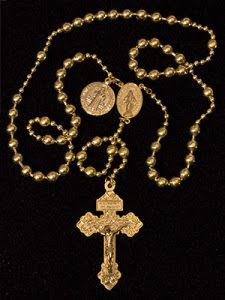
Battle Rosary, used in WWII
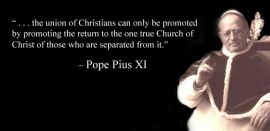
Pope Pius XI Encyclical “Casti Connubi”
(On Christian Marriage) December 31, 1930

“Right is right if nobody is right,
and wrong is wrong if everybody is wrong”
Archbishop Fulton J. Sheen

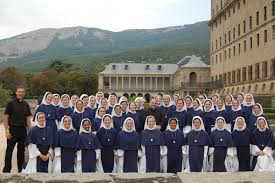
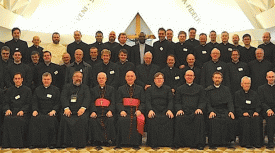
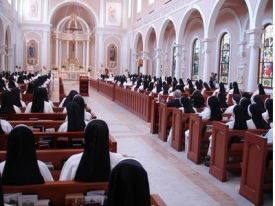

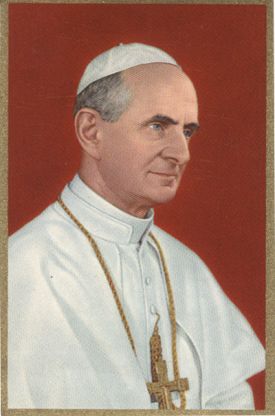
Conception Until Natural Death
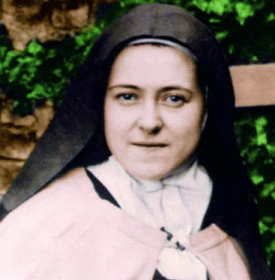

Sacred Heart of Jesus
We Place Our Trust in Thee



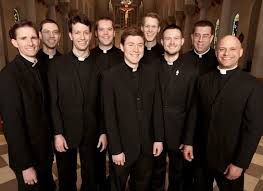
Pray for Vocations to Priesthood

